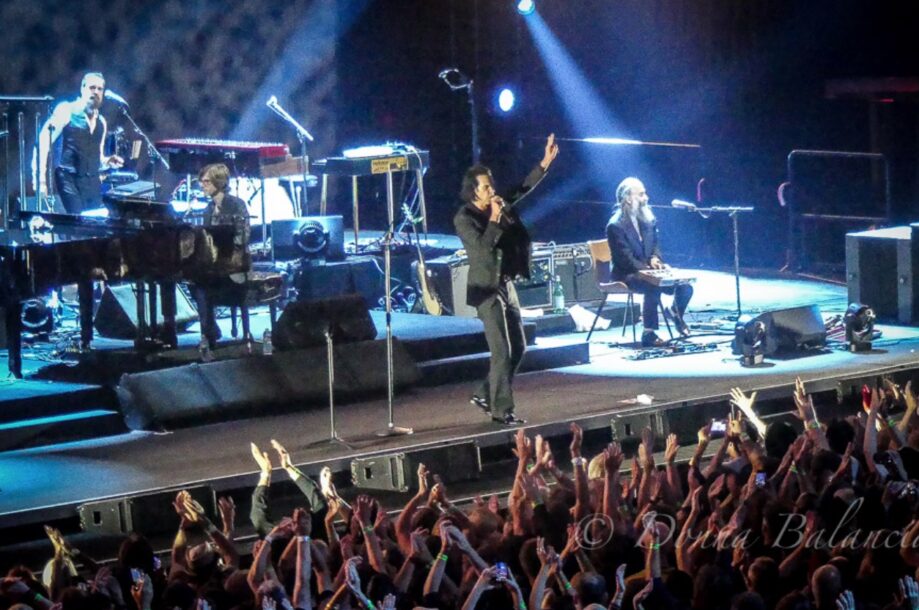
By AVA LIVERSIDGE
Carnage, the most recent conception of Australian gothic rocker Nick Cave and composer/multi-instrumentalist Warren Ellis, boasts such a palpable and visceral vision, it rivals film in affectation. This record is Cave and Ellis demonstrating mastery over scene, mood, crescendo and ferocity – something they’ve had time to harness over the years spent collaborating in Nick Cave & The Bad Seeds, as Ellis assumed the role of co-producer on their project’s last two records.
The distinction between The Bad Seeds and this particular collaboration is not necessarily one that needs to be made, save for the most explicit influences Ellis has on the record’s instrumentals, particularly as Cave staves off electric guitar in favor of Ellis’s classical composing abilities. Aided by the album’s aurally gothic opera-esque leanings, the duo were able to produce eight visually stunning tracks that yank listeners through scenes of both rolling meadows and the far-off cosmos whose juxtaposition continuously tumble brilliantly into discord, but never aimless cacophony.
Cave has been outspoken about his need for anguish or plain struggle, as a mechanism to produce his art. Struggling as a means to create would be no revolutionary concept in the alternative music scene, if it weren’t for Cave’s utter devotion to gloom in each consecutive project. Carnage, however, seems to be the product of when this downright catastrophe need not be synthesized, and instead occurs independently from self-infliction or struggle-searching in the smoldering drama that is a pandemic.

I don’t mean to say that the record is pandemic-inspired, or has any sort of semblance to the countless records that have emerged with cheap references to the hardships of a newly-virtual world, but it could be classified as a record heavily influenced by apocalypticism out of either artists’ controls. This sovereign chaos is a particularity amongst music tradition, one that is defined by musicians in control of their medium- in control of the narrative, the composition, the quality. Carnage seems to lack such ownership. Autonomous disorder acts as dictator, and Cave and Ellis are slaves to its lawlessness.
Cave’s signature narration makes this discord rest all the heavier; he is unwilling to proselytize and is unbothered by trying to persuade the listener. Cave’s tendency is telling you exactly what he thinks, stream-of-consciousness-style, seemingly without much regard for poetic inclination. The beauty in his chronicles is candid, unpolished, but just as anapestic. This honesty combined with Ellis’s occasional vocal interruption and compositional affection for crescendo and dynamism tend to encourage dissonance, a great reflection of the record’s mood and derivation.
Carnage is a gothic-electro symphony fit for a church hurtling through a celestial body; it is space-age violin experimentalism amidst bucolic dissension. Each track is strikingly atmospheric — the listener is both lying in green pastures and gliding through constellations.
Another duality emerges between the stagnance confronted most explicitly on “Albuquerque” but also displayed in Cave’s descent into vocal monotone, in contrast with the transportive journey the sonics otherwise suggest, particularly on title track “Carnage.” Once again, the audience is left in a familiar disarray.
Carnage is upsetting, other-wordly and provocative. Even the title, “carnage”, serves to portray the intensity Ellis and Cave must’ve lended themselves to while bringing the project to fruition.
“Hand of God” is the record’s most brilliant display of the duo’s potential to orchestrate a scene. While motifs of rivers and valleys permeate the record, conjuring heavenly settings, “Hand of God” combines aspects of a deified landscape with all of the overwhelming facets at play- the natural world, battling electronic and orchestral layers, a disruptive choir, and space-aged repetition of the title as an act of hypnosis to meld each component. Moreover, despite each moving part, out of the dissonance emerges an experiential track with the same impact on an audience that any visual aid could muster.
On Carnage, Cave and Ellis devise a timely epic that delivers chaos as a mechanism to both disturb and spellbind.
